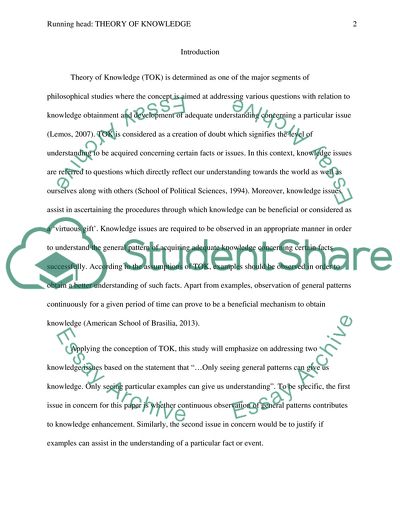Cite this document
(The Theory of Knowledge Literature review Example | Topics and Well Written Essays - 1500 words, n.d.)
The Theory of Knowledge Literature review Example | Topics and Well Written Essays - 1500 words. https://studentshare.org/psychology/1794842-theory-of-knowledge-tok-only-seeing-general-patterns-can-give-us-knowledge-only-seeing-particular-examples-can-give-us-understanding-to-what-extent-do-you-agree-with-these-assertions
The Theory of Knowledge Literature review Example | Topics and Well Written Essays - 1500 words. https://studentshare.org/psychology/1794842-theory-of-knowledge-tok-only-seeing-general-patterns-can-give-us-knowledge-only-seeing-particular-examples-can-give-us-understanding-to-what-extent-do-you-agree-with-these-assertions
(The Theory of Knowledge Literature Review Example | Topics and Well Written Essays - 1500 Words)
The Theory of Knowledge Literature Review Example | Topics and Well Written Essays - 1500 Words. https://studentshare.org/psychology/1794842-theory-of-knowledge-tok-only-seeing-general-patterns-can-give-us-knowledge-only-seeing-particular-examples-can-give-us-understanding-to-what-extent-do-you-agree-with-these-assertions.
The Theory of Knowledge Literature Review Example | Topics and Well Written Essays - 1500 Words. https://studentshare.org/psychology/1794842-theory-of-knowledge-tok-only-seeing-general-patterns-can-give-us-knowledge-only-seeing-particular-examples-can-give-us-understanding-to-what-extent-do-you-agree-with-these-assertions.
“The Theory of Knowledge Literature Review Example | Topics and Well Written Essays - 1500 Words”. https://studentshare.org/psychology/1794842-theory-of-knowledge-tok-only-seeing-general-patterns-can-give-us-knowledge-only-seeing-particular-examples-can-give-us-understanding-to-what-extent-do-you-agree-with-these-assertions.


